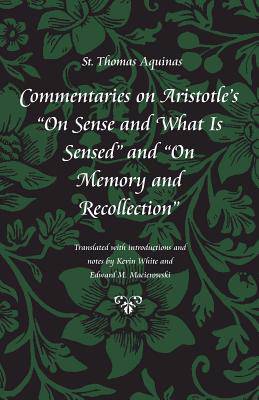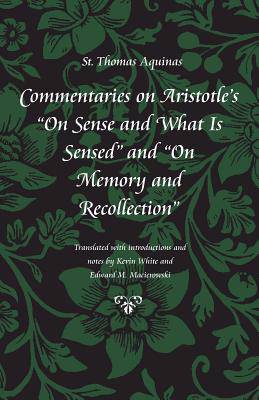
Bedankt voor het vertrouwen het afgelopen jaar! Om jou te bedanken bieden we GRATIS verzending (in België) aan op alles gedurende de hele maand januari.
- Afhalen na 1 uur in een winkel met voorraad
- Gratis thuislevering in België vanaf € 30
- Ruim aanbod met 7 miljoen producten
Bedankt voor het vertrouwen het afgelopen jaar! Om jou te bedanken bieden we GRATIS verzending (in België) aan op alles gedurende de hele maand januari.
- Afhalen na 1 uur in een winkel met voorraad
- Gratis thuislevering in België vanaf € 30
- Ruim aanbod met 7 miljoen producten
Zoeken
Commentaries on Aristotle's "on Sense and What Is Sensed" and "on Memory and Recollection"
Thomas Aquinas
€ 41,95
+ 83 punten
Omschrijving
In traditional catalogues of Aristotle's works, "On Sense and What Is Sensed" and "On Memory and Recollection" are the immediate sequels to his "On the Soul," and the first two books of his so-called parva naturalia, or "little works in natural philosophy." In keeping with this order, Thomas Aquinas began his series of Aristotelian commentaries with a commentary on "On the Soul," which he followed with commentaries on "On Sense and What Is Sensed" and "On Memory and Recollection," written in 1268-70. Until now, these latter two commentaries have never been published in English translation. The translations presented in this volume are based on the critical Leonine edition of the commentaries, which includes the Latin translations of the Aristotelian texts on which Aquinas commented. The volume includes English translations of these Latin translations, allowing the reader to compare Aristotelian text and Thomistic commentary in detail. The translations of both commentaries are furnished with introductions and notes by the translators. The commentary on "On Sense and What Is Sensed" is divided into a prologue and eighteen chapters. In the prologue Aquinas makes an important statement concerning the division and order of the theoretical sciences. In the commentary he clarifies and develops the text's discussion of sense-powers, its "application" of sense-powers to organs and objects, and its concluding questions concerning the object and medium of sensation, and the role of the "common sense." In "digressions" from his literal exposition, Aquinas presents discussions bearing on psychology, epistemology, natural philosophy, and metaphysics. The commentary on "On Memory and Recollection" is divided into eight chapters, the first three of which deal with memory, and the last five with recollection. The former part addresses three questions: "What is memory?" "To what part of the soul does memory belong?" and "What is the cause of remembering?" The part on recollection also addresses three questions: "What is recollection?" "How does recollecting take place?" and "What is the difference between memory and recollection?" In "digressions," Aquinas explores more fully the issues arising from the exposition of the text.
Specificaties
Betrokkenen
- Auteur(s):
- Vertaler(s):
- Uitgeverij:
Inhoud
- Aantal bladzijden:
- 296
- Taal:
- Engels
- Reeks:
Eigenschappen
- Productcode (EAN):
- 9780813213828
- Verschijningsdatum:
- 21/12/2004
- Uitvoering:
- Paperback
- Formaat:
- Trade paperback (VS)
- Afmetingen:
- 159 mm x 215 mm
- Gewicht:
- 385 g

Alleen bij Standaard Boekhandel
+ 83 punten op je klantenkaart van Standaard Boekhandel
Beoordelingen
We publiceren alleen reviews die voldoen aan de voorwaarden voor reviews. Bekijk onze voorwaarden voor reviews.









